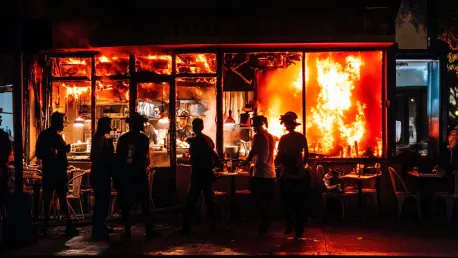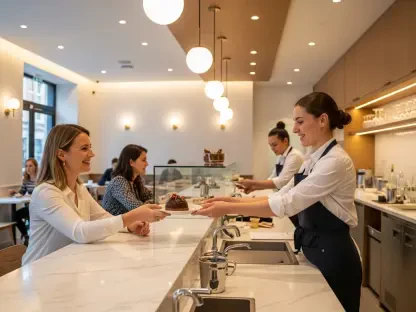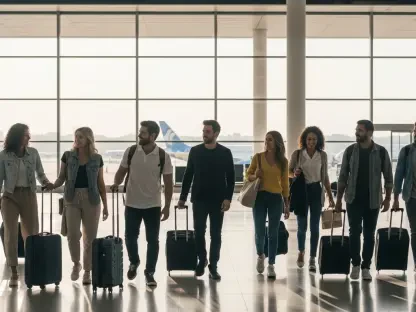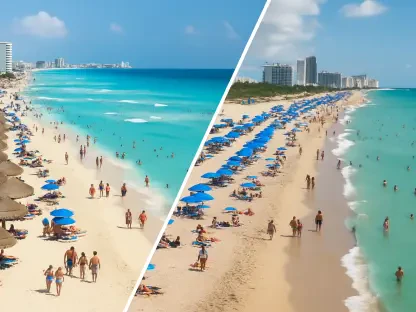The devastating impact of the Palisades and Eaton fires has left a profound mark on the personal and professional lives of restaurant workers in Los Angeles. These natural disasters have not only ravaged homes and workplaces but have also highlighted the resilience and solidarity that define this community. The narrative of their struggles and the efforts made to support them reveal a heartfelt battle against unforeseen adversities, underscoring the integral role these workers play in the hospitality industry. The stories of individuals, the unfolding community support, and strategic fundraising efforts paint a comprehensive picture of perseverance and hope amidst calamity.
The Impact of Fires on Restaurant Workers
Personal Struggles and Community Resilience
Felipe Ortega, a 64-year-old bartender and maintenance worker who served at Gladstones for 38 years, embodies the ordeal that many restaurant workers face after the Palisades fire ravaged the establishment. Extending beyond financial loss, Ortega’s struggles include the emotional burden of uncertainty. As someone who relied on his job to support his family, the abrupt halt in income has plunged him into a state of anxiety, especially as he juggles paying monthly rent and medical bills for his daughter’s recent appendectomy. His daughter’s touching inquiries about their future underline the desperate circumstances they face; a sentiment shared by thousands across the L.A. region who form the backbone of the restaurant industry.
The extent of these workers’ contributions to the restaurant industry often goes unnoticed until a crisis emerges. Their roles in ensuring smooth and warm service epitomize their importance, making their displacement due to the fires an acute economic and personal blow. This significant workforce, now standing at risk with the loss of primary income sources and the obliteration of homes, represents heroes whose everyday efforts sustain communities. As these unsung workers face joblessness and the fracturing of daily life, the pervasive sentiment of resilience resonates, bolstered by community and coworker support.
Community Support and Fundraising Efforts
In response to the crisis, restaurant operators and nonprofit organizations such as the California Restaurant Foundation have mobilized initiatives to assist the workers who have borne the brunt of the fires. One poignant example is the GoFundMe campaign initiated for Gladstones, which has garnered over $21,000 of its $250,000 goal. Reflecting a relentless community effort, such initiatives aim to provide temporary relief to affected employees, supporting them through these dire times as the long-term restoration efforts progress.
The uncertainty surrounding the future of Gladstones is palpable. With a need to secure the livelihoods of its staff for at least the next two months, the GoFundMe initiative represents a lifeline. Employees like Felipe Ortega, who have imbued the restaurant with their dedication over decades, cling to the hope of reopening while simultaneously bracing for potentially prolonged hardship. The shared narratives within this community drive an ongoing commitment to resilience, underscored by the spirit to rebuild and restore, even amidst unpredictable tides.
Stories of Loss and Hope
Wilfredo Quinteros’ Journey
In another heartbreaking account, Wilfredo Quinteros, a 55-year-old food runner who worked at Moonshadows in Malibu for 23 years, details a poignant loss that transcends mere employment. The ocean-view sunsets he cherished from the dining room are now a distant memory after the fire leveled the beloved restaurant. As the sole breadwinner for his partner and grandchild, Quinteros grapples with the combined strain of financial instability and the emotional weight of losing a place closely tied to his identity. His persistent optimism and reliance on industry ties exemplify a determination to navigate these turbulent times.
This story of personal loss and collective resilience illustrates broader themes resonant throughout the affected community. Quinteros’ struggle to find new employment amidst the uncertainty of disaster strikes a chord with countless other service workers. The dilemma of maintaining financial responsibility while processing emotional turmoil underscores the multifaceted challenges faced by those in the industry. Communities rallying together to offer support in moments of such profound loss highlight a resilient spirit that refuses to be subdued by adversity.
The Destruction of Community Hubs
The comprehensive impact of the fires is further illustrated by the razing of numerous Altadena establishments, including the beloved Cafe de Leche. Owner Matthew Schodorf recounts the devastation of his cafe and the displacement of six employees who contributed significantly to the community’s fabric. This cafe held a cherished place as a community hub, fostering personal connections between employees and patrons that went beyond transactional interactions. The loss of such spaces mirrors a larger trend of job insecurity and displacement among service workers grappling with the aftermath of these natural disasters.
Schodorf’s narrative reveals the intricate tapestry woven by community-driven establishments and underscores the personal connections that elevate the daily work of restaurant employees. The displacement experienced by Cafe de Leche staff epitomizes the broader issue of home and job insecurity faced by workers whose contributions are inextricably linked to their neighborhoods. Behind these stories lies a resilient community entrenched in mutual support, striving to rebuild and restore the integral connections fostered through local establishments.
Fundraising as a Lifeline
Community Contributions and Support
In the face of such substantial loss, community support emerges as a beacon of hope and stability. The Schodorfs, leveraging platforms like GoFundMe, have garnered significant contributions to aid their displaced employees. The accumulation of modest donations reflects the community’s deep appreciation for the cafe’s integral role in their daily routines and underscores the power of collective action in mitigating individual hardships.
Similarly, establishments like Side Pie and Fox’s restaurant have depended on fundraisers to aid their owners and staff, illustrating a communal life raft during these troubled times. These initiatives aim to facilitate the transition by helping cover the costs associated with securing new housing and essential expenses. The Eaton fire, which displaced Amara Kitchen’s Altadena cafe staff, exemplifies the broader disruption wrought on service workers, leading to drastic reductions in work hours and shifts, impacting financial stability. These fundraising campaigns provide critical support, offsetting immediate needs while employees navigate the uncharted waters of recovery.
Navigating New Challenges
Despite commendable efforts to support affected workers, the path to recovery remains fraught with challenges. Service-industry workers must contend with finding new housing, navigating insurance claims, and addressing transportation issues—each factor cutting into their work hours and adding layers to the already complex process of rebuilding their lives. The uncertainty of these components complicates the recovery timeline, making financial and emotional stability elusive.
The concerted community fundraising efforts provide some relief, yet they are not panaceas for the deep and multifaceted traumas that these individuals endure. The necessity to juggle multiple aspects of life amidst the backdrop of disaster showcases the resilience and determination present within the service industry. As these workers strive to piece together their livelihoods, they embody the spirit of perseverance that underscores the community’s collective fight against natural disasters.
Individual Hardships and Communal Efforts
Personal Stories of Hardship
Illustrating the pressing need for communal support, individuals like Jaime Pacheco, a bus person at Frogtown taqueria Salazar, and Erich Martinez, a cook at Echo Park’s Tsubaki, have found their lives upended by the fires. The stories of Pacheco losing everything and Martinez grappling with significant personal loss spotlight the critical hardships and the community’s responsive efforts to assist. Fundraising efforts tailored to these specific cases highlight individual narratives that contribute to the wider mosaic of resilience and determination.
Moreover, the tale of Chef Travis Hayden exemplifies the scale of devastation experienced. Hayden’s home at the Pacific Palisades Bowl Mobile Estates park was lost while he worked at Bar Etoile. Left with little more than a cracked heirloom mortar and pestle, Hayden’s reliance on a GoFundMe campaign—supported by an array of friends, former classmates, and strangers—echoes the broad solidarity underpinning these communal efforts. His story reflects the shared hardship and collective endeavor to support those left in precarious circumstances by the fires.
The Abrupt End to Stability
The devastating Palisades and Eaton fires have left an indelible mark on the lives of restaurant workers in Los Angeles, both personally and professionally. These natural disasters not only destroyed homes and workplaces but also brought to the forefront the resilience and solidarity of this tight-knit community. The stories of their struggles, combined with the efforts to support them, reveal a profound battle against unexpected adversity. This narrative underscores the essential role these workers play in the hospitality industry, which is often overlooked but is now in the spotlight due to these calamities.
The tales of individual hardships, community support initiatives, and strategic fundraising efforts form a comprehensive picture of determination and hope amidst widespread destruction. Restaurant workers, who provide invaluable services, have shown incredible strength in the face of these fires. Communities have rallied together, offering a lifeline through financial support, temporary housing, and emotional backing.
Organizations and individuals have launched numerous fundraising efforts, using platforms like GoFundMe and hosting community events to gather resources for affected workers. These collective efforts underscore the significant role of unity and mutual support in overcoming such formidable challenges. The community’s unwavering commitment to helping their own reflects the broader spirit of resilience that characterizes Los Angeles in times of crisis.









